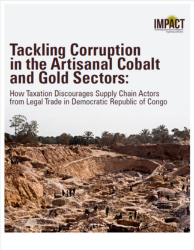High taxes and arduous administrative burdens are pushing artisanal mining actors across Democratic Republic of Congo (DRC) into informality and illegality—even when legal trade is an option. This jeopardizes any efforts towards cleaning up supply chains, especially as the spotlight shines on cobalt and gold.
IMPACT’s newest paper, Tackling Corruption in the Artisanal Cobalt and Gold Sectors: How Taxation Discourages Supply Chain Actors from Legal Trade in Democratic Republic of Congo, examines how the fiscal regime is contributing to corruption and proposes recommendations to the DRC government for reform.
IMPACT has found artisanal supply chain actors across both gold and cobalt supply chains being charged taxes and fees which have no legal basis. This is discouraging them from participating in the legal supply chain. If the price for legal production and trade becomes too burdensome, it dissuades legality and therefore participation in any ongoing efforts to establish responsible supply chains.
There is already significant evidence of how DRC’s artisanal gold sector is undermined by exorbitant taxes that push actors to smuggling. In cobalt, informal taxes and payments are being imposed onto the upstream artisanal cobalt supply chain, contributing to corruption.
As part of IMPACT’s Mapping Payments project, stakeholders across Lualaba Province and Kinshasa came together in a series of workshops to agree on the legally required taxes, fees, and administrative steps in the cobalt supply chain, as well as create proposals on how to increase transparency and legal trade. This builds off similar work for artisanal gold in Ituri Province.
The recommendations to the DRC government to address corruption in the artisanal gold and cobalt sectors were compiled from the multi-stakeholder consultations.
Read now: Tackling Corruption in the Artisanal Cobalt and Gold Sectors
The Mapping Payments project is undertaken with funding provided by the European Union. Funding for complimentary activities was provided by Microsoft.
Photo by Sebastian Meyer/Getty


